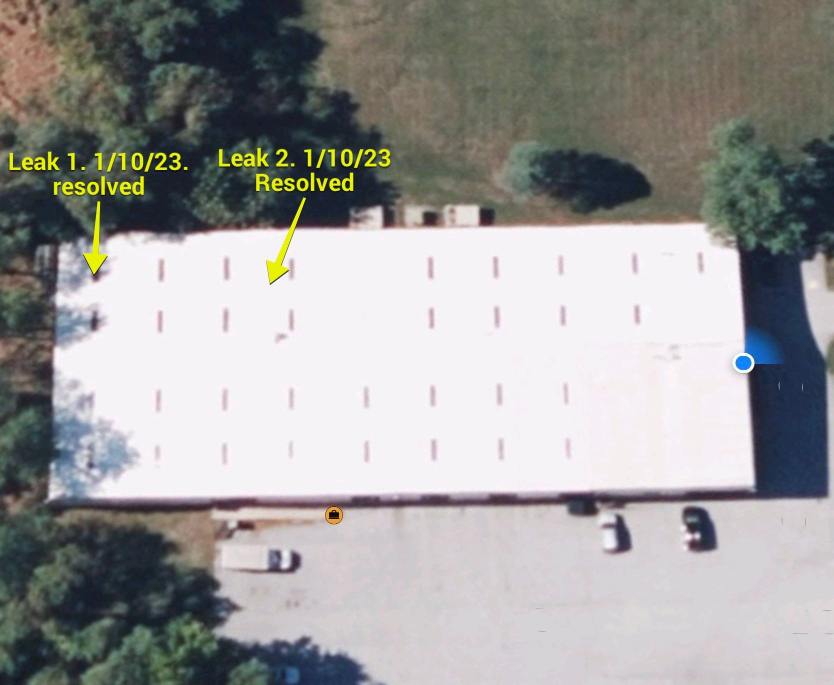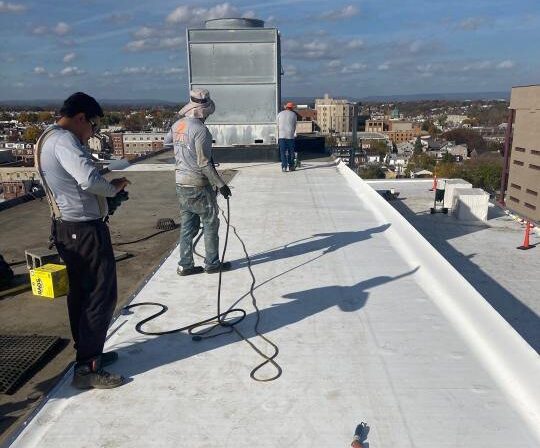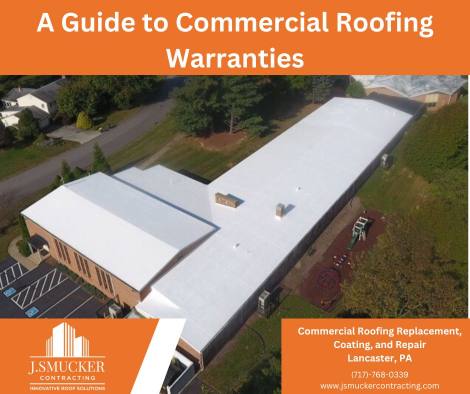- By admin
- Commercial Roof Warranty, Commercial Roofing
- 0 Comment
A Guide to Commercial Roofing Warranties
When it comes to commercial roof warranties, it is crucial for building owners and managers to have a clear understanding of the type of roof warranty that comes with the new or restored roof they are purchasing. This knowledge not only helps in managing the roof asset and budget, but it also provides an insight into the quality of the roofing system. In general, a high-quality warranty on a high-quality roofing system is more beneficial in the long-run than a low-quality warranty on a low-quality roofing system.
While most people tend to focus on the length of the warranty, it is important to pay attention to other factors and details in the warranty and understand what is covered and what is not. In this article we’re going to break down commercial warranties so that you can be educated and prepared for the inevitable roof replacement that eventually comes down the line.
What Is a Typical Commercial Roofing Warranty?
This is somewhat of a loaded question as many roof warranties can be all over the board based on the type of building and type of roofing system installed. However, it’s important to understand that any roofing system will generally have two warranties; the manufacturer warranty and the labor or “workmanship” warranty.
Manufacturer Warranty
The manufacturer warranty is based on the roofing material itself. Keep in mind that the materials are not produced by the roofing contractor, but by a separate third party. Examples of industry leading roofing materials manufacturers include companies like Conklin, Versico, GAF and Flex. Therefore, the manufacturer of the roofing materials provides a written guarantee on the materials for a certain amount of time. This ensures that the manufacturer will take responsibility for repairing or replacing their product within a certain time frame if necessary. For example, shingles generally have a limited lifetime warranty, while a standard TPO warranty is 20 years, PVC 25 years, and coating systems are usually covered under warranty for 10 to 18 years. Some systems, like TPO or PVC, may also offer a “total system warranty” that covers both the labor and the materials; but this will certainly come at an additional cost.

The manufacturer's warranty ensures any defects in the product are covered by the materials manufacturer
Labor Warranty
The roofing contractor or installer also provides a written warranty on his workmanship, known as the labor or “workmanship” warranty, which ensures that the contractor will take responsibility for correcting or replacing any issues related to the installation of the roofing system within a certain time frame.
The length of the labor or “workmanship” warranty varies from company to company. Some companies offer 1 year, some 5 – and some as long as the material. The reason there is such a large variation in labor warranties is because they are mostly for peace of mind for the client. But in reality, poor installation of the materials isn’t going to take a decade to reveal itself. Leaks due to improper installation will usually show themselves right away, or certainly within the first year. This is in contrast to materials, which can have a factory defect that leads to the material wearing down ten years down the road. Some contractors will also offer opportunities for extended labor warranties; provided the client agrees to yearly inspections.
It’s also important to understand that labor warranties only cover the labor to fix the roof if it is leaking due to poor installation of the roof system. Warranties in general do not cover damage caused by events such as a falling branch poking a hole through the membrane or an HVAC tech dropping a screwdriver and damaging the roof.
Lastly, it’s important to note that there may be some contingencies attached to your manufacturer’s warranty (and in some cases the labor warranty as well) in order to make it valid. For example, some warranties will require yearly preventative maintenance and inspections. Some material manufacturers will require these yearly inspections to be documented in order to maintain the validity of the warranty. Beyond simply keeping your warranty valid, it’s always important to remember that preventative roof maintenance is always better than reactive roof repair

Regular, yearly inspections to your roof validate your warranty and ensure small problems don't turn into larger ones
How Long Does A Commercial Roof Warranty Last?
The length of a commercial roof warranty depends on the materials used and the manufacturer. Depending on the materials, the average warranty can last anywhere from 10 to 25 years. More specifically, a standard TPO warranty is around 20 years, and a standard PVC warranty around 25 years. Shingles tend to have a limited lifetime warranty.
The labor warranty will vary with different roofing contractors. Many reputable companies, for instance here at J Smucker Contracting, we offer a one year standard warranty, and then as long as our customer pays the yearly preventative maintenance fee, the warranty will continue up until the manufacturer’s warranty expires. So for PVC membrane as an example, customers will get a matching 25 year labor warranty alongside of the manufacturer’s warranty so long as the customer continues to pay the yearly preventative maintenance fee, which is extremely important in order to keep your new roofing system problem free.
Do Roofs Usually Have A Warranty?
Yes, all roofs should come with a warranty. Period. If the contractor you’re looking to hire does not provide a warranty, do not hire them.
How to Use Your Commercial Roof Warranty
Finally, we will discuss how to properly use a commercial roof warranty. When it comes to warranty procedures,it should all start with calling the company (contractor) that installed it.
Customers of a reputable roofing company should never have to do more than that. Once an issue is raised, the roofing contractor should schedule a time to arrive on scene, inspect the roof and return it to its leak free status. If there is any warranty paperwork or follow up needed with the manufacturer, the contractor should also be taking care of this.
With reputable, efficient and honest contractors, the client should be able to make one phone call and everything should be taken care of afterwards by the contractor. If your roofing company is requiring more than that, it’s best to look elsewhere. If you run into a situation where the company that installed your roofing system is out of business, then you will need to call the manufacturer and they will most likely send a local company out to handle it.
Final Thoughts
In conclusion, understanding commercial roof warranties is crucial for building owners and managers in order to exercise the full potential of their roofing system. It’s important to read and understand the terms and conditions of a warranty before purchasing a commercial roofing system, and to keep proper documentation and maintain the roof according to the manufacturer and contractors recommendations in order to keep the warranty valid. This should always involve yearly preventative maintenance and inspections.
Make sure you find a quality roofing contractor that has years long experience in commercial roof contracting. For general information about finding a quality contractor, you can read one of our latest articles “5 Tips for Choosing Top Rated Roofing Company in Harrisburg”.
For any additional questions regarding commercial roofing and the warranties that accompany it, do not hesitate to contact J Smucker Contracting. We’ll be happy to answer any questions you may have!

